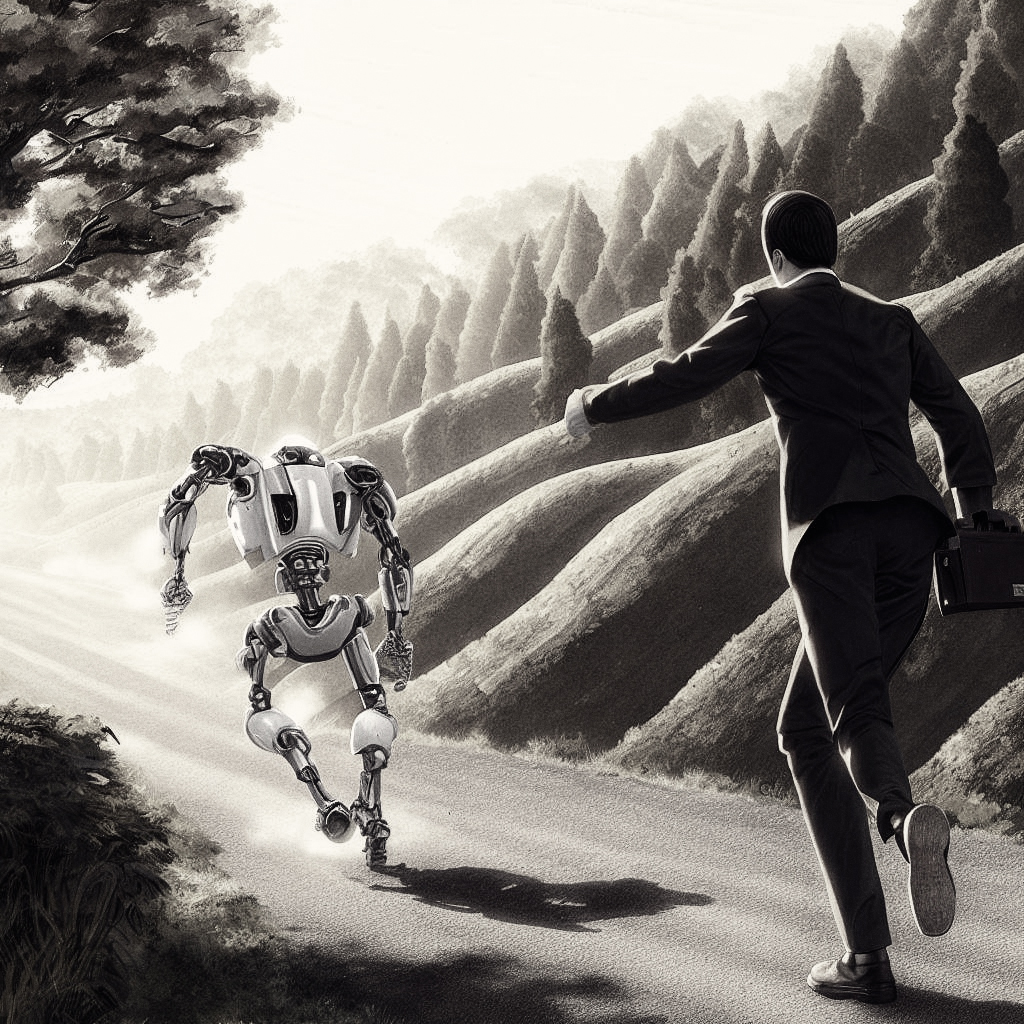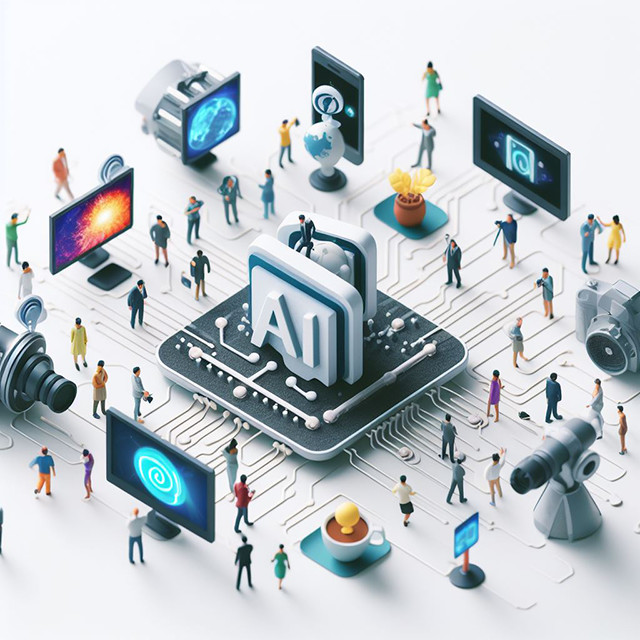Preparing for an AI Future: Skills and Mindsets to Avoid Being Left Behind
The rapid development of artificial intelligence (AI) promises to bring major changes across many industries and facets of life. With AI systems taking on more complex capabilities, many wonder how humans can avoid being left behind. What skills and mindsets will be necessary to adapt and even thrive in an AI future?
Understanding Core AI Concepts:
While not expected to become AI experts, having a basic grasp of key AI concepts will provide a helpful foundation. Getting acquainted with terms like machine learning, neural networks, and data training can shed light on how many modern AI systems function under the hood.
Machine learning is a subset of AI where algorithms are trained to make predictions or decisions by learning patterns from data, rather than being explicitly programmed with rules. Instead of code, the logic comes from analyzing examples. Neural networks are machine learning models inspired by the biological brain, with interconnected nodes called neurons that process information. Through techniques like deep learning, neural nets can train on very large and diverse datasets to handle complex tasks like image recognition and language translation.
Data is the fuel that powers machine learning models. Quality training data is vital for performance. The models gradually adjust internal parameters to better fit the patterns in data over many iterations.Testing data is used to evaluate models after training. Understanding this flow from data to trained models lays the groundwork for properly applying AI.
Recognizing Use Cases and Limitations:
AI should not be viewed as a magic solution to every problem. Having realistic expectations about its capabilities in different domains is important. AI excels at narrow, well-defined tasks with clear measures of success, like playing chess or Go, transcribing speech, inspecting products, and recommending content. It struggles with open-ended and ambiguous goals, or tasks requiring lots of background knowledge.
While progress is being made on more flexible, general AI, most current systems are narrow AI suited for specific use cases. Understanding these strengths and limitations helps identify promising applications while avoiding hype and unrealistic expectations. It also underscores the continued value of human strengths like creativity, empathy, and contextual reasoning in many areas.
Gaining Hands-On Experience with AI Tools:
Interacting directly with AI systems helps demystify them and builds knowledge. Many user-friendly platforms now exist for exploring pre-trained models. For example, services like Google Cloud Vision, AWS Comprehend, and CAD-based 3D generators allow feeding in images, text, or designs and receiving AI-generated descriptions, insights, or 3D model adjustments.
Experimenting through online services, demo apps, and open libraries like TensorFlow gives first-hand experience of AI’s capabilities. Working through tutorials and sample code familiarizes users with the workflows for training, deploying, and integrating AI models. It’s an effective way to learn strengths and limitations. Starting small also illuminates considerations like processing needs, training data requirements, and post-deployment monitoring.
Practicing Interacting with AI Agents:
In addition to behind-the-scenes development and training, it’s valuable to get comfortable interacting with AI systems from the user perspective. With voice assistants like Siri, Alexa and Google Home proliferating, we increasingly converse with AI agents. Practicing posing queries, giving instructions, and understanding responses prepares us for these natural interactions.
The same goes for chatbots which are being integrated into customer service, sales, and other functions. Testing different bots gives a feel for current capabilities and limitations in natural language processing. Games like board game apps that use AI opponents are another engaging way to experience AI systems first-hand. Getting used to these types of interactions helps build familiarity and mental models of how AI works.
Gaining Data Science Skills:
Given the importance of data in training AI systems, learning some core data science skills can provide an edge. Having the ability to collect, clean, parse, and analyze datasets enables better leverage of AI tools. Data visualization using charts, graphs and maps also helps interpret outputs and identify patterns.
Some facility with programming languages like Python or R used for data science work is useful. Many platforms like Jupyter Notebook lower the barrier to getting hands-on with data. Taking courses on platforms like Coursera, Udacity and edX can build important capabilities to augment AI systems. Understanding your data makes it more valuable.
Useful online learning resources include Datacamp for interactive Python, R, SQL and data science courses, as well as Kaggle's hands-on micro-courses using real-world datasets.
Studying AI Ethics and Social Impacts:
For long-term relevance, technical skills should be supplemented by studying social implications. AI-based pattern recognition and profiling can negatively impact fairness and justice. Biases hidden in data and algorithms can lead to discriminatory results. Understanding issues around transparency, accountability and control will lead to healthier AI integration.
Learning about responsible development practices, testing for unwanted bias, and providing meaningful human oversight minimizes adverse impacts while maximizing benefits. Examining case studies in problematic AI deployments raises awareness of pitfalls to avoid. Keeping humans in the loop for reviewing recommendations and resolving disputes is important. Prioritizing ethics helps advance AI for social good.
Focusing On Unique Human Qualities:
Rather than competing directly with AI systems in purely technical realms, leveraging uniquely human qualities is key. Areas like imagination, creativity, empathy, leadership, strategy, and design thinking highlight complementary capabilities. These reflect higher emotional and social intelligence.
Nurturing playfulness, curiosity, philosophy, art, and culture expands abilities that AI currently lacks. No matter how advanced machines become, certain human qualities and experiences will remain valuable. Cultivating deeper human connections and meaning seems likely to grow in importance alongside widespread automation. Identifying and developing these complementary strengths and talents will allow unique human thriving.
Adopting an Adaptable Mindset:
Given the rapid pace of progress in AI, trying to learn everything upfront is less feasible than adopting an adaptable mindset. With flexibility, openness to learning, and willingness to evolve, humans can integrate emerging technologies smoothly rather than being displaced. Periodic skills upgrading in response to market demands makes one’s expertise a moving target rather than fixed.
Seeing oneself as a permanent beta with ample room for growth is healthy. The most future-proof expertise combines specialization with a generalist ability to quickly pick up new competencies. Broad thinking complements specific skills. With AI in its infancy, the experts of tomorrow may bear little resemblance to today. Planning to continuously learn and embrace new paradigms keeps one ahead of the curve.
AI Learning Opportunities in Barcelona:
Barcelona offers many promising avenues for locals to learn skills for adapting to an AI-integrated world. Students can choose degree programs in Computer Science, Data Science, Cognitive Systems, and related fields from universities like the Barcelona School of Informatics and the UPC BarcelonaTech. These provide rigorous training in AI foundations.
Shorter courses are also available through institutions like Ironhack and Barcelona Code School. Their bootcamps and workshops offer introductions to data science, machine learning engineering, and other practical skills.
For hands-on learning, makerspaces like MakerStation and Fab Lab Barcelona provide equipment and guidance on creating AI-enabled devices with sensors and chipsets like Arduino and Raspberry Pi. Barcelona's thriving startup ecosystem also presents opportunities to gain experience applying AI in fields like autonomous vehicles, robotics, and medical technology.
By taking advantage of these local resources, Barcelona citizens can stay at the forefront as AI grows. With the right blend of technical knowledge, human-centered design, and ethical application, the city is poised to demonstrate AI's immense potential for improving lives if shaped thoughtfully.



Comments
Post a Comment